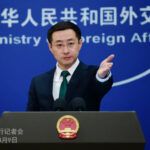Think positive: How to get North Korea to roll back its nuclear weapons activity
By Paige P. Cone | October 20, 2017
If the definition of insanity is doing the same thing over and over while expecting different results, insanity is an apt description of US sanctions policy against North Korea. Though North Korea has been under sanctions for more than a decade, both bilaterally from the United States and multilaterally from the United Nations, North Korean leader Kim Jong-un’s fervor for strengthening his nuclear weapons program has only increased. He responded to new sanctions imposed by the United Nations in September by conducting further nuclear tests. This prompted the United States to propose even harsher sanctions, and for US President Donald Trump to respond to Kim with fiery rhetoric of his own.
This is a dangerous cycle, leaving room for nothing but further escalation. Rather than proposing harsher sanctions or threatening military action, the United States would be better served by offering North Korea positive inducements to roll back its nuclear activity. Though most scholars of counterproliferation focus on the efficacy of economic sanctions, the current cycle of interaction between North Korea and the United States raises the question: Under what conditions do major powers influence leaders to stop pursuing nuclear weapons programs? If history is any indication, the carrot is more effective than the stick.
What are positive inducements? Inducements, broadly defined, are instruments used to persuade a state or other actor—in this case, North Korea—to change its behavior. When used as tools of counterproliferation, they can be either positive or negative in nature.
There are two types of positive inducements that can bring about nuclear reversal, the decision by a state to give up its nuclear weapons or its technical capabilities to produce a nuclear weapon: economic incentives, such as the transfer of technology, money, or knowledge in exchange for abandoning nuclear weapons; or security incentives, such as offering assurances to remove a perceived threat, placing a state under the nuclear umbrella of a nuclear power, building confidence by creating or strengthening alliances, or offering diplomatic recognition.
Negative inducements likewise take the form of either economic or security disincentives. Economic strategies include imposing sanctions on a state, or threatening to withhold promised aid. Security options include the threat or use of military intervention.
Most studies have focused almost exclusively on the efficacy of economic sanctions to prevent or reverse nuclear proliferation. Very few have analyzed the utility of positive inducements (for exceptions see this, this, and this), and even fewer have looked at the net effects of comprehensive packages that include both positive and negative inducements—although proliferation diplomacy often embraces such packages as a way of dealing with states of concern.
My research sheds new light on the relationship between inducements and nuclear reversal, offering a novel approach to identifying the policy options that work best at compelling leaders to reverse their programs. I created a dataset that weighs the combined effects of five types of positive inducements and three types of negative inducements. The dataset offers the first systematic examination of the net effect of inducements on the nuclear weapons development process, and recommendations about when it would be valuable for major powers to offer positive inducements to proliferators. For example, positive inducements were very effective at getting Iran to agree to a nuclear deal in 2015, as Rupal Mehta, an assistant professor at the University of Nebraska-Lincoln, has explained.
Past efforts at diplomacy. Trump has repeatedly condemned everyone from US allies to previous administrations for being too “soft” on North Korea. However, a closer examination of US policy toward North Korea reveals a complex history of relations between the two countries.
There have been two major attempts at diplomatic offers to North Korea in exchange for an end to its nuclear weapons programs. The first was in the early 1990s, after fears of nuclear activity escalated when Kim Il Sung announced his decision to withdraw from the Nuclear Non-Proliferation Treaty (NPT). In 1994, the United States and North Korea entered into the Agreed Framework, which called for energy aid from the United States (in the form of proliferation-resistant reactors) in exchange for the halting of nuclear programs by North Korea. This meant freezing the production of nuclear power reactors and plutonium production capabilities as well as remaining party to the NPT. The deal eventually collapsed, due at least in part to delayed policy reviews with the election of President George W. Bush that tied up aid on the United States’ end, and to the discovery that North Korea was pursuing a uranium enrichment program, which gave hardliners in the administration an excuse to abandon the Agreed Framework.
The second attempt at diplomacy, known as the six-party talks, included the United States, Russia, China, North Korea, South Korea, and Japan. The talks never culminated in definitive action—or, to put it differently, in a credible offer from the United States. Amid these ongoing talks, which began in 2003 and lasted through the mid-2000s, the United Nations imposed increasingly stringent sanctions on North Korea.
The use of positive inducements has never been fully realized in the case of North Korea. Each time an aid package was proposed, it was subsequently removed from the table. Trump’s assertion that previous administrations have been too soft on North Korea is therefore ill founded. If the United States were able to make a credible offer to Kim Jong-un—such as the lifting of harsh sanctions, the promise of aid, or the opportunity for trade relations—positive inducements might be a more viable option than additional sanctions.
Why positive inducements might work. My research finds that positive inducements are generally more effective than negative inducements at getting leaders to reverse their nuclear activity. There are several reasons why positive inducements will probably work better than negative inducements in North Korea specifically: First, the threat or use of negative inducements may actually incite leaders to continue their nuclear weapons programs at a more rapid pace. Second, the use of economic sanctions in particular is often ineffective in matters of nuclear reversal, even when sanctions are targeted rather than comprehensive. This is particularly true for North Korea, as it is generally isolated from international trade. Perhaps more important, the Kim regime is not beholden to its population in the same way that a democracy would be, or even in the same way Russian President Vladimir Putin is beholden to oligarchs in his state. Finally, positive inducements offer a face-saving option that is particularly important in the nuclear realm, because many leaders—and certainly Kim Jong-un—seek nuclear weapons as a powerful status symbol. By accepting economic or military aid, or even diplomatic recognition from major powers, Kim can gain something for his regime without capitulating to negative pressure from the United States.
The current strategy employed by Trump—of responding to Kim’s provocative behavior with harsh, sometimes even belligerent, rhetoric—does nothing but make Kim lash out with more aggressive behavior. Kim’s worst fear is of US interference in North Korea, and he (and his father and grandfather before him) has used the threat of American imperialism as the cornerstone of his domestic propaganda. North Korean nuclear weapons are painted as an essential defense against this threat. By threatening the use of force, or even the strengthening of sanctions against Pyongyang, Trump not only restarts the cycle of interaction between the United States and North Korea, but escalates the situation tweet by tweet.
The price of military action. Critics of any strategy centered on positive inducements worry about the potential for rewarding bad behavior. US Secretary of State Rex Tillerson raised this concern in April, saying “We will not negotiate our way back to the negotiating table with North Korea.” However, the White House must give serious thought to whether military action, which is a real possibility on the current trajectory, is a worthwhile tradeoff for not “rewarding” Pyongyang’s nuclear escalation. North Korea has seen three leaders in Pyongyang issue increasingly inflammatory threats against the United States, but that does not mean the interaction with North Korea has to culminate in a military crisis.
The 2015 Joint Comprehensive Plan of Action (JCPOA) for Iran showed that a nuclear deal can be made even when the parties to it do not have a long history of trust, and even when allies in the region are concerned about the deal. However, Trump’s decision to decertify the deal calls into question the credibility of the United States. The JCPOA, contrary to Trump’s statements, is not a “one-sided” deal; it has strict enforcement mechanisms to ensure that Iran is complying with the terms. One of the most concerning long-term consequences of abandoning the deal is the potential for North Korea to see the United States as unreliable, and thus squander any chance of Kim Jong-un taking seriously an offer of positive inducements. This is something that must be taken into account over the 60-day period that began on October 13, as Congress decides whether or not to reinstate sanctions on Iran. The decision will affect US relationships with allies, potential opportunities for nuclear cooperation, and the credibility of the United States in the international system.
The escalating crisis with North Korea will not be solved with continued harsh rhetoric from the United States. Rather, a concentrated effort by the major powers is needed: The United States and its allies must be willing to offer positive inducements to North Korea to roll back its nuclear activity, and Kim Jong-un must find the offer of positive inducements believable.
Together, we make the world safer.
The Bulletin elevates expert voices above the noise. But as an independent nonprofit organization, our operations depend on the support of readers like you. Help us continue to deliver quality journalism that holds leaders accountable. Your support of our work at any level is important. In return, we promise our coverage will be understandable, influential, vigilant, solution-oriented, and fair-minded. Together we can make a difference.
Topics: Nuclear Weapons, Voices of Tomorrow















